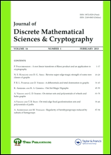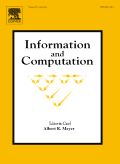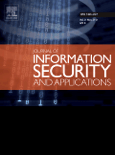
JOURNAL OF DISCRETE MATHEMATICAL SCIENCES & CRYPTOGRAPHY
Scope & Guideline
Advancing Knowledge in Algebra and Beyond
Introduction
Aims and Scopes
- Discrete Mathematics:
The journal focuses on various aspects of discrete mathematics, including graph theory, combinatorics, and number theory, emphasizing their applications in cryptographic methods and algorithms. - Cryptography and Information Security:
A core area of the journal is the study of cryptographic techniques, protocols, and their resilience against modern threats, including quantum computing vulnerabilities and lightweight cryptography for resource-constrained devices. - Computer Security and Privacy:
Research on securing digital communications, data integrity, and privacy preservation in cloud computing, IoT, and smart environments is a significant focus, reflecting the journal's commitment to addressing contemporary security challenges. - Interdisciplinary Applications:
The journal encourages interdisciplinary research that applies mathematical principles to diverse fields such as healthcare, finance, and social networks, showcasing the relevance of discrete mathematics and cryptography in real-world scenarios. - Algorithm Development and Optimization:
Papers often explore novel algorithms for data encryption, secure communication, and intrusion detection systems, highlighting advancements in computational methodologies and their implications for cybersecurity.
Trending and Emerging
- Post-Quantum Cryptography:
With the potential threat posed by quantum computing to current cryptographic systems, there is an increasing volume of research focused on developing quantum-resistant algorithms and protocols. - Machine Learning in Cybersecurity:
The integration of machine learning techniques for threat detection, anomaly recognition, and predictive analytics in cybersecurity is a rapidly growing area, indicating a shift towards data-driven security solutions. - IoT and Edge Computing Security:
As IoT devices proliferate, research focusing on securing these devices and their networks has surged, particularly regarding lightweight cryptographic solutions and secure communication protocols. - Blockchain Technology Applications:
The application of blockchain for enhancing security in various domains, including healthcare and supply chain management, is on the rise, reflecting its potential for decentralized security solutions. - Privacy-Preserving Mechanisms:
There is a notable trend towards developing privacy-preserving authentication and data sharing techniques, particularly in sensitive areas such as healthcare and financial transactions, highlighting the importance of user privacy in modern applications.
Declining or Waning
- Classical Cryptographic Techniques:
There is a noticeable decline in papers focused solely on classical cryptographic methods such as RSA and DES, as the research community shifts towards post-quantum cryptography and novel approaches that address emerging security threats. - Traditional Graph Theory Applications:
Research directly applying basic graph theory concepts to cryptography or security has decreased, with a shift towards more complex and interdisciplinary approaches that integrate advanced mathematical concepts. - Static Security Measures:
Papers focusing on static or one-time security measures are becoming less frequent as the emphasis moves toward dynamic, adaptive security frameworks that can respond to evolving threats in real-time. - Single-Factor Authentication Systems:
There is a waning interest in single-factor authentication mechanisms, with a growing focus on multi-factor authentication and biometric systems that offer enhanced security. - Basic Steganography Techniques:
Traditional steganographic methods are seeing reduced publication frequency, potentially due to advancements in more sophisticated data concealment techniques that leverage machine learning and advanced algorithms.
Similar Journals

Cybersecurity
Advancing Cyber Resilience Through Innovative ResearchCybersecurity, published by SpringerNature, serves as a pivotal platform in the realms of Artificial Intelligence, Information Systems, Software, and Computer Networks and Communications. With an impressive Impact Factor and an Open Access model initiated in 2018, this journal facilitates widespread dissemination of innovative research findings to a global audience. Based in the United Kingdom, Cybersecurity aims to advance knowledge and application in security innovations, risk management, and system resilience against cyber threats. The journal's current standing is prominently reflected in its Q1 and Q2 ratings across various computer science categories, indicating its reputable contribution to the academic community. By continuously publishing cutting-edge research, Cybersecurity plays a crucial role in informing policy decisions, advancing technology, and enhancing the collective understanding of cyber resilience, making it an essential resource for researchers, professionals, and students alike.

INFORMATION AND COMPUTATION
Pioneering Research in Computational Theory and MathematicsINFORMATION AND COMPUTATION is a peer-reviewed academic journal published by Academic Press Inc., Elsevier Science, dedicated to advancing the fields of computational theory and mathematics, computer science applications, and information systems. With an ISSN of 0890-5401 and an E-ISSN of 1090-2651, the journal provides a platform for innovative research that spans theoretical and applied perspectives. Acknowledged for its impact in the community, it holds a Q2 quartile ranking in several categories, including Computational Theory and Mathematics and Computer Science Applications, as of 2023. These rankings place it among the leading journals in its field, making it an essential resource for researchers, professionals, and students aiming to stay abreast of cutting-edge developments. While it does not currently offer Open Access options, the journal intends to foster scholarly communication and knowledge sharing from its inception in 1987 to its future issues expected through 2024. Located in the United States, at 525 B ST, STE 1900, SAN DIEGO, CA 92101-4495, INFORMATION AND COMPUTATION is committed to publishing high-quality research that influences the theoretical foundations and practical applications of its diverse disciplines.

Journal of Information Security and Applications
Advancing the Frontiers of Information SecurityJournal of Information Security and Applications, published by ELSEVIER, is a premier outlet for cutting-edge research in the field of information security and applications. With a dedicated ISSN of 2214-2126 and an E-ISSN of 2214-2134, this journal ranks impressively in the top quartile (Q1) across multiple categories as of 2023, including Computer Networks and Communications, Safety, Risk, Reliability and Quality, and Software. The journal’s notable Scopus rankings further reflect its impact, holding positions within the top 15% in several engineering and computer science areas. Spanning a converged period from 2013 to 2024, the journal aims to disseminate high-quality research findings, facilitating a vibrant platform for scholars, practitioners, and students to engage with contemporary challenges in information security. Although not an open-access journal, the knowledge shared within its pages is indispensable for those dedicated to advancing the technological and theoretical underpinnings of security measures in various applications.

CANADIAN JOURNAL OF MATHEMATICS-JOURNAL CANADIEN DE MATHEMATIQUES
Your gateway to impactful mathematical discoveries.Canadian Journal of Mathematics - Journal Canadien de Mathématiques is a prestigious peer-reviewed journal published by Cambridge University Press, which aims to advance the field of mathematics through the dissemination of high-quality research articles. With its ISSN 0008-414X and E-ISSN 1496-4279, the journal plays a pivotal role in fostering mathematical research and collaboration. It has been recognized for its impactful contributions, currently holding a category quartile ranking of Q2 in Mathematics (miscellaneous) for 2023 and sits in the 66th percentile among its peers according to Scopus rankings. As the journal continues its convergence from its inception in 1994 through to 2024, it remains a vital resource for researchers, professionals, and students seeking to stay at the forefront of mathematical developments. The journal does not operate under an open access model, allowing for a curated collection of articles that adhere to rigorous academic standards.

Prikladnaya Diskretnaya Matematika
Advancing the Frontiers of Applied Mathematics.Prikladnaya Diskretnaya Matematika, published by the PUBLISHING HOUSE SCIENTIFIC & TECHNICAL LITERATURE in the Russian Federation, serves as a vital resource for scholars and practitioners in the realms of applied mathematics, computational theory, and discrete mathematics. With an ISSN of 2071-0410 and an E-ISSN of 2311-2263, this journal has been actively contributing to the academic discourse since its inception in 2016, with expectations to continue until at least 2024. Although currently positioned in the Q4 category across several disciplines—including applied mathematics, computational theory, and signal processing—this journal offers a unique opportunity for researchers to contribute to an evolving field, despite facing competitive rankings in the Scopus database. The open access nature of the journal reflects a commitment to disseminating knowledge broadly, albeit details regarding access options remain unspecified. As a publication dedicated to fostering innovation and collaboration in theoretical and practical applications, Prikladnaya Diskretnaya Matematika plays an important role in advancing mathematical theories and practices, making it pertinent for those engaged in research and application within these critical domains.

ISeCure-ISC International Journal of Information Security
Transforming Knowledge into Security SolutionsISeCure-ISC International Journal of Information Security, published by the Iranian Society of Cryptology, is a vital open-access platform dedicated to advancing the field of information security. Since its inception in 2009, the journal has strived to disseminate high-quality, peer-reviewed research that addresses contemporary challenges in information security, cryptography, and related computational disciplines. With an ISSN of 2008-2045 and an E-ISSN of 2008-3076, it has gained visibility in the academic community, evidenced by its Quartile 4 ranking across multiple categories such as Applied Mathematics, Computational Theory, and Information Systems. This journal aims to foster innovative solutions and theoretical advancements, targeting researchers, professionals, and students who seek to contribute to and learn from the latest developments in the field. By providing a venue for explorative and empirical research, ISeCure-ISC holds an important position in promoting knowledge and collaborative efforts within the global information security landscape.

Advances in Mathematics of Communications
Fostering Collaboration in the World of Mathematical ResearchAdvances in Mathematics of Communications, published by the American Institute of Mathematical Sciences (AIMS), is a leading journal dedicated to the dissemination of high-quality research in the fields of algebra, number theory, applied mathematics, discrete mathematics, combinatorics, and computer networks. Established in 2008, this journal has quickly established itself as a significant contributor to mathematical communications, holding a reputable position in the Scopus rankings, with impressive category quartiles, including Q2 rankings in key areas such as Algebra and Number Theory and Applied Mathematics. Besides its rigorous peer-review process, the journal facilitates the growth of innovative ideas and methodologies that bridge the gap between theory and application. With no open access restrictions, Advances in Mathematics of Communications aims to provide an inclusive platform for researchers, professionals, and students to share their findings and insights, fostering collaboration and advancing the global knowledge base in the mathematical sciences. The journal's commitment to excellence ensures its role as an essential resource in the ever-evolving landscape of mathematics.

Cryptography and Communications-Discrete-Structures Boolean Functions and Sequences
Unraveling the complexities of sequences in secure data processing.Cryptography and Communications - Discrete Structures, Boolean Functions and Sequences is a distinguished journal published by Springer, focusing on the crucial intersections of cryptography, discrete mathematics, and communication systems. With a significant presence in the academic community since its inception in 2009, the journal has established a robust reputation, holding a Q1 ranking in Applied Mathematics and notable positions in other relevant categories, reflecting its impact in the field. Researchers and professionals will find this journal engaging as it rigorously explores the theoretical underpinnings and practical applications of boolean functions and sequences, essential for advancing secure communication protocols and efficient data processing. Despite not currently offering open access, the journal is highly regarded for its quality peer-reviewed articles, making it a vital resource for scholars aiming to contribute to or stay at the forefront of cryptographic research. Its continual publication through 2024 ensures an ongoing dialogue in this rapidly evolving field, enhancing understanding and innovation among its readership in the United States and beyond.

Algebra And Discrete Mathematics
Unlocking New Perspectives in Algebraic and Discrete ResearchAlgebra And Discrete Mathematics, published by LUHANSK TARAS SHEVCHENKO NATIONAL UNIVERSITY, is a pivotal academic journal dedicated to exploring the realms of algebra and discrete mathematics. Since its inception in 2012, this journal has contributed significantly to the mathematical community, catering to researchers, professionals, and students interested in advancing their understanding of both classical and contemporary mathematical theories. With categories placed in Q4 in Algebra and Number Theory and Q3 in Discrete Mathematics and Combinatorics, and rankings that place it among various domains with percentiles reflecting its niche status, the journal offers a platform for innovative and high-quality research. While the journal is currently not open access, it maintains a robust academic presence, and its continuous publication until 2024 ensures a steady stream of scholarly discourse. Researchers and academics keen on disseminating their findings or keeping abreast of the latest developments in these mathematical fields will find valuable insights and diverse methodologies within its pages.

Theoretical Computer Science
Bridging Theory and Application in Computer ScienceTheoretical Computer Science, published by Elsevier, serves as a pivotal platform in the field of computational theory, exploring the foundational aspects of computer science and mathematical logic since its inception in 1975. With both a print ISSN of 0304-3975 and an E-ISSN of 1879-2294, this journal is esteemed for its rigorous peer-review process and commitment to advancing knowledge in theoretical frameworks and algorithms. Positioned in the Q2 quartile for both Computer Science (miscellaneous) and Theoretical Computer Science categories, it ranks #124 out of 232 in general computer science and #73 out of 130 in theoretical computer science according to Scopus metrics, reflecting its significant influence and reach within the academic community. Researchers and professionals can access this journal through institutional subscriptions, providing a plethora of high-quality articles that contribute to ongoing debates and developments in the discipline. The journal's scope encompasses a wide array of topics, ensuring relevance across various subfields, thus making it an essential resource for anyone dedicated to furthering their understanding of theoretical computer science.